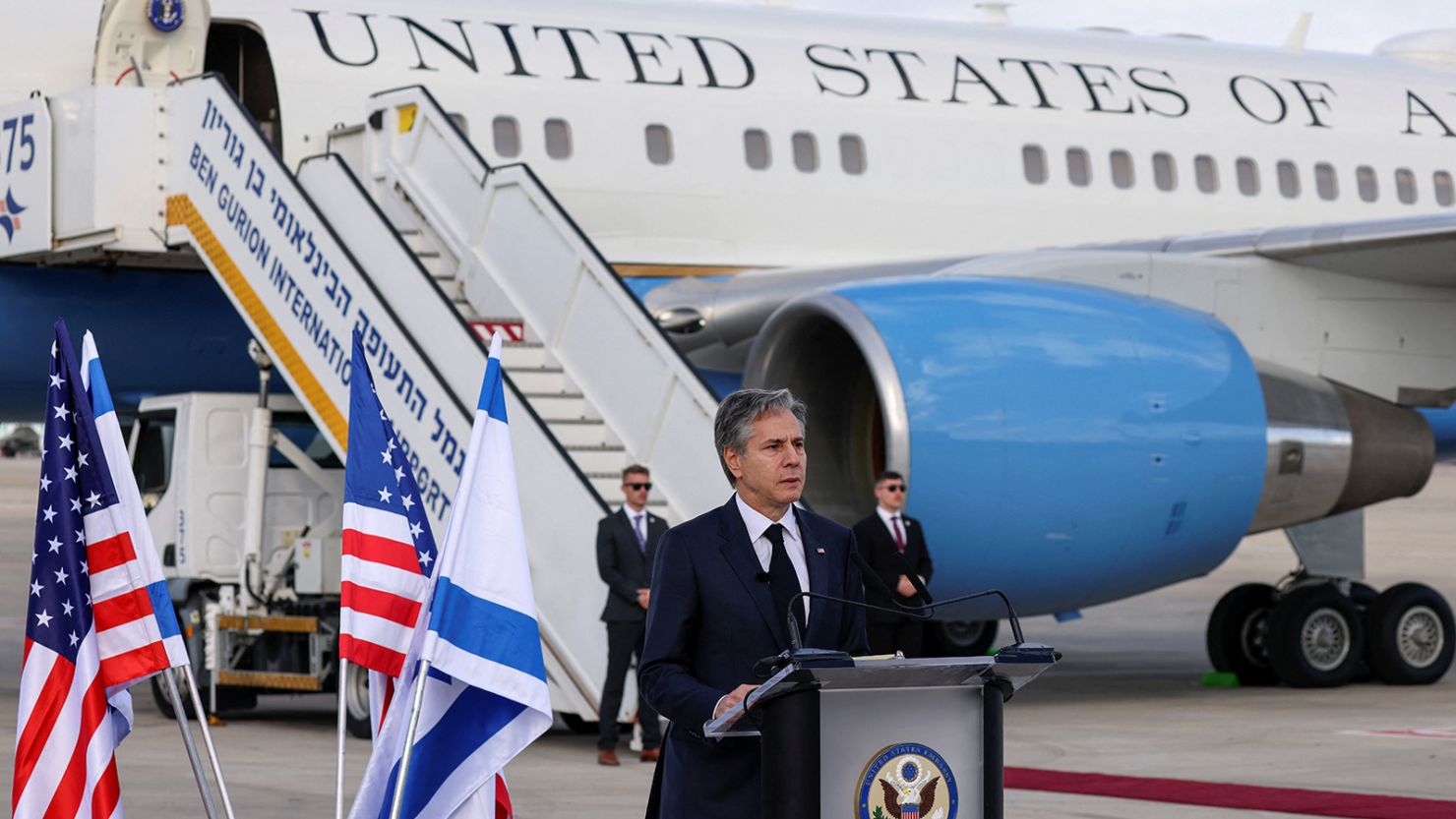Editor’s Note: A version of this story appears in today’s Meanwhile in the Middle East newsletter, CNN’s three-times-a-week look inside the region’s biggest stories. Sign up here.
US Secretary of State Antony Blinken’s trip to Israel and the West Bank may have been in the works for weeks, but it couldn’t come at a more pressing time.
Both Palestinians and Israelis have suffered terrible bloodshed in the last few days, and fears are growing that the situation will spiral out of control. Thursday was the deadliest day for Palestinians in the occupied West Bank in nearly two years, followed by a shooting near a Jerusalem synagogue Friday night, which Israel has deemed one of its worst terror attacks in recent years.
Even before the latest flare-up, the trip was expected to be prickly, as Blinken’s first visit to Israel since the installation of Prime Minister Benjamin Netanyahu’s government – widely considered the most far-right and religious in Israeli history.
Now hope hinges on the arrival of the US top diplomat on Monday to help cool the rising temperatures on the ground.
Security coordination crisis
Aside from trying to calm the situation through dialogue, one of Blinken’s main priorities will likely be to try to restore crucially important security coordination between Israel and the Palestinian Authority (PA).
The PA announced it was severing the coordination on Thursday, following a deadly Israeli military raid in the West Bank which killed 10 people, among them militants and at least one civilian woman, according to both Israeli and Palestinian officials. The US immediately said ending security cooperation was not “the right step to take at this moment.”
The coordination is seen by many Israeli and American officials as a vital part of maintaining some level of calm, as it involves sharing of intelligence on militant activity, and also links between Israeli and Palestinian security forces. Without that coordination, Israel may not be able to tell Palestinian security forces where and when they will be operating in the West Bank, which could lead to dangerous mistakes or clashes between the two.
But the PA has been under pressure for months to cut off the coordination, often seen by Palestinians as forcing them to do Israel’s bidding on occupied territory. It has taken such steps in the past, in 2020 severing coordination for six months when Israel announced ultimately unfulfilled plans to annex parts of the West Bank, and in 2017 briefly after Israeli police placed metal detectors at the entrances to the Haram Al-Sharif or Noble Sanctuary, known to Jews as Temple Mount, in Jerusalem.
“This security coordination is both humiliating and ineffective,” Nour Odeh, a former spokeswoman for the PA, told CNN. “The PA right now is losing, not just losing control, but losing face. It has no money to pay salaries. It has no control, no ability to protect its citizens, and yet it is expected from the world to protect the occupier and coordinate with them.”
Retired Israeli Col. Michael Milshtein, former head of the Department for Palestinian Affairs in Israel Defense Intelligence, said he hopes Blinken will “leverage or pressure the PA to renew the security coordination,” adding that it would be even better if the “Egyptians and the Jordanians put their pressure on (PA President Mahmoud) Abbas.”
Milshtein said resuming security coordination would not only “reduce the general tension,” but send a signal to Palestinian militant groups that rival the PA.
“It’s also going to signal to other organizations, players like (militant groups) Hamas and Islamic Jihad, that there is no vacuum that they can get in and use it to promote their terror attacks. And that the old rules of the game are preserved,” he said.
But Odeh said pushing the Palestinians back toward coordination “won’t be an easy sell, because that will mean a loss… in the eyes of Palestinians.”
Pressure on Netanyahu
Blinken’s first stop is in Israel, where he will meet with Netanyahu and other top Israeli officials.
It’s during these meetings, both Milshtein and Odeh said, that Blinken should put the pressure on Netanyahu to resist the more extremist wings of his cabinet, some of whom have called for the dismantling of the PA, while others have called for the death penalty for those Israel accuses of terrorism.
The Israeli government, in response to two shooting attacks in Jerusalem that killed seven civilians and injured five, rolled out a series of measures including plans to demolish the homes of the attackers and drafting legislation to revoke Israeli identity cards and residency of families of those Israel has accused of terrorism, practices critics say are forms of collective punishment proscribed by international law.
“I know how complex is the current government, it’s not easy to promote strategy or promote even negotiations with the Palestinians. But in the end of the day, (Netanyahu) should understand that we’re standing between bad and worse alternatives,” Milshtein said.
Blinken should also demand Israel changes its policies toward the PA, Milshtein said, especially moves that negatively impact the economic health of the territories.
“I think that right now the PA is in a very fragile and very weak status, every punishment or economic punishment, will actually undermine and damage more the stability of the PA,” Milshtein said. “Although the PA causes a lot of problems to Israel… we have much more profits from the existence of the PA than from its vanishing.”
Odeh said Blinken needs to show Netanyahu that Israeli military operations in the West Bank, which have increased over the past year in response to a series of attacks targeting Israelis, are only making things worse. Last year was the deadliest year for Palestinians in the occupied West Bank, and for Israelis, in nearly two decades.
“They can tell this government that this modus operandi doesn’t work. You can’t keep pushing Palestinians like that. You can’t have more than 30 Palestinians killed in less than a month [as has happened in January]. You can’t demolish homes – that will expel families – and [impose] collective punishment measures,” Odeh said.
“It won’t be long before Palestinians say, ‘You know what, we have to also organize and defend ourselves … nobody’s there to help us. So we’re going to do it ourselves.’ When you get there, nobody can put a lid on that,” Odeh said.
Hopes are not high that Blinken’s visit will dampen the smoldering embers in Israel and the Palestinian territories, especially as the Ramadan and Passover holidays approach, traditionally a period that has led to clashes in Jerusalem.
“Right now, the temperature, the atmosphere on the ground is very high. So you need only one spark to really bring a broad explosion,” Milshtein said.
Nic Robertson and Vasco Cotovio contributed to this report.
The digest
Iran summons Ukraine diplomat over comments on drone strike
Iran summoned Ukraine’s charge d’affaires in Tehran on Monday over his country’s comments on a drone strike on a military factory in the central Iranian province of Isfahan, according to state-backed Press TV. An adviser to Ukranian President Volodymyr Zelenskiy linked the incident directly to the war in Ukraine. “Explosive night in Iran,” Mykhailo Podolyak tweeted on Sunday. “Did warn you.”
- Background: Iran’s Ministry of Defense said that the Saturday attack took place using “small drones against a defense ministry industrial complex,” adding that there were no casualties and only “minor damage was sustained to the roof of the complex.” Russia on Monday condemned the strike and warned against “provocative” actions that could trigger an escalation in an already tense situation. Oil prices climbed on Monday.
- Why it matters: Ukraine accuses Iran of supplying hundreds of drones to Russia which are used to attack civilian targets in its cities. Iran has acknowledged sending drones to Russia but says they were sent before Moscow’s invasion of Ukraine last year. Moscow denies its forces use Iranian drones in Ukraine, although many have been shot down and recovered there. US media outlets reported that US officials believe the attacks were carried out by Israel. CNN has not independently confirmed that information.
Qatar replaces Russia in three-way consortium exploring Lebanon’s offshore energy blocks
Oil companies TotalEnergies and Eni said Monday that they have transferred a 30% interest to QatarEnergy in two exploration blocks off the coast of Lebanon, Reuters reported, citing TotalEnergies chairman and CEO Patrick Pouyanné. The three-way consortium deal is meant to provide TotalEnergies and Eni with a 35% interest each, with QatarEnergy holding the remaining 30% stake, which until last September belonged to Russia.
- Background: Lebanon first signed a consortium with TotalEnergies, Eni and Russia’s Novatek to begin exploration in 2017. But in September, Russia pulled out of the deal, leaving its share to the Lebanese government. A month later, Lebanon – which for years bickered with neighboring Israel over a long-disputed maritime border – finally signed a US-brokered deal with Israel to demarcate the area in the Mediterranean Sea that is believed to be rich in oil and gas.
- Why it matters: Lebanon hopes that discoveries in the potentially energy-rich blocks would help its shattered economy as well as incentivize future investors to participate.
Top US Treasury official to discuss Russian sanction evasion on trip to Oman, UAE and Turkey
Under Secretary of the Treasury for Terrorism and Financial Intelligence Brian E. Nelson is traveling to Oman, the UAE and Turkey this week, where he plans to discuss Russia’s attempts to evade international sanctions amid the Ukraine war, according to a US Treasury statement on Saturday.
- Background: The US has been concerned about Russia’s attempts to evade sanctions imposed by the US and its international partners since the start of the Ukraine war in February 2022. Two main hubs hosting Russian businessmen have been Turkey and the UAE. Last year, international financial crime watchdog the Financial Action Task Force (FATF) placed the UAE on a “grey” money-laundering watch list in an effort to subject its finances to increased monitoring.
- Why it matters: Nelson’s trip comes amid strained ties between Turkey and NATO over Turkish President Recep Tayyip Erdogan’s close ties with Moscow. It also comes as the UAE and other Gulf Arab states expand international partnerships beyond the US.
What’s trending
Saudi Arabia: #I_hate_the_niqab
A hashtag decrying the Islamic face veil, or niqab, was trending in Saudi Arabia on Monday, leading to a flood of tweets in defense of the covering.
While “I hate the niqab” was trending, few posts were seen supporting the hashtag, with most instead defending the veil. Many, particularly men, called for women to respect Islamic customs. Others saw it as an attack on their faith and called for women to keep away from feminist ideas.
“Some (women) say that the world is changing and within five years we won’t be seeing the niqab or the hijab (head covering)… that people should be judged by the Creator, not other people,” said a man in a video posted on Twitter. “It’s better for you (woman) to be quiet and not talk about religion from an ignorant perspective.”
Most Muslims don’t consider the face veil to be mandatory under Islamic law, and the covering is only worn by deeply conservative Muslims.
Saudi Arabia has been undergoing an immense social change, driven by the government, which has seen it ease restrictions on women’s dress, gender mixing and live entertainment, all of which were previously seen as taboo. The religious police, who once roamed the streets to enforce the rules, have had their coercive powers significantly reduced in recent years.
It is unclear how the hashtag was started, but bot activity to promote certain topics is not uncommon in the kingdom. Twitter has in the past shut down thousands of accounts in Saudi Arabia for bot activity.
The face veil, which is also known as the burqa in some Muslim countries, has been banned in several European countries.
Photo of the day



